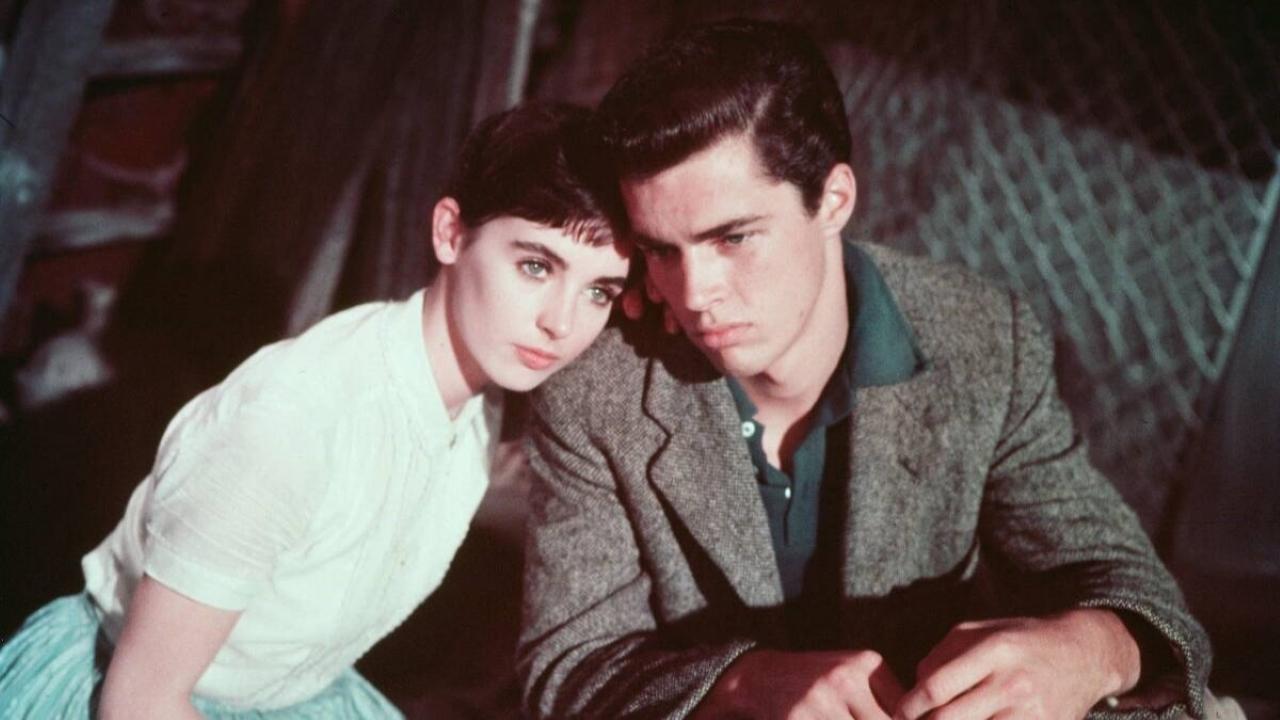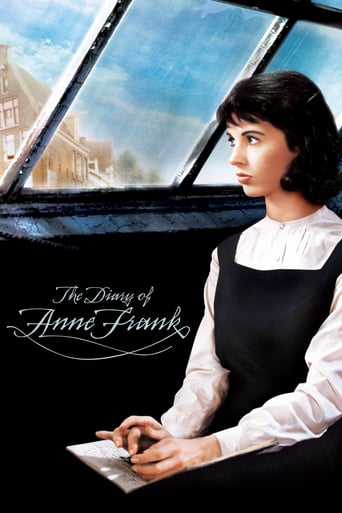

It must be one of hollywoods travesties that Milly wasn't recognised for her fantastic performance in this movie . It proves that these Oscars were handed out to favourable characters rather than based on actual acting in the given movie Considering this was her first big acting role. Milly completely makes this film worthwhile and believable . To the fools in the academy that never recognised her superb performance back in 59' "Quack Quack"
... View MoreHaving seen Anne Frank's house in Amsterdam, I felt disappointed by this 'classic' film. It does just not stand up and at one point I felt it inspired Mel Brooks 'The Producers.'Anne Frank recorded her story of hiding in a loft with her family as well as others, living for several years in cramped harsh conditions hoping to evade the Nazis. What we get is an overlong, mawkish film that wants to concentrate more in the love interest between Anne and a boy called Peter from the other family. We get little of the terror that these families would had felt. The film lacks the claustrophobia that should be presented to the audience. It really is a film of its time stripped of all the harshness of war.Worse the actress playing Anne looks too old and is rather bland.
... View MoreIt's a splendidly done movie, a tale of eight Jews hiding in a Dutch attic for two years during the war, effectively directed by George Stevens and magnificently photographed by William Mellor.And I can't watch it very often because I know how it's going to end and it's embarrassing to be moved. I feel the same way about some other tragedies. I want to warn Janet Leigh before she steps into the shower in "Psycho." I want to tell Montgomery not to send the Polish airborne into the hellish cauldron of Arnhem. I want Vincent and Paul to found their artists' colony in Arles. I don't want to watch Brutus going around begging for one of his friends to run him through with his own sword. I want to grab Romeo and tell him Juliet isn't really dead. I want Stanley Kowalski to shut the hell up and let Mitch marry Blanche DuBois, not that he'd listen.On top of that, I can't just dismiss this as just a movie, because, before that it was a play, and before that it was an historical event. Well, mostly. Someone went through the historiography of Anne Frank's diary and found it had been sanitized over the years, first by Mr. Frank, then by the playwrights. She was pretty candid about her sexual development, and not nearly as forgiving as the movie makes her out to be. She was more nearly human than the figure we see on the screen.Millie Perkins is Anne. She's not bad considering her age but there are some painful moments too. Everyone else is professional at least. The director, George Stevens, started his career with Laurel and Hardy two reelers and masterpieces like "Kentucky Kernels" but went on to develop an extremely effective directorial approach that was his alone in movies like "Shane" and "A Place In The Sun." He's very good here and uses the Cinemascope screen like a master.There are moments of suspense, terror, sentiment, and even some comedy, but the film can't escape it's historical roots. How could civilized human beings do things like this to one another?
... View MoreGeorge Stevens' 1959 Classic, 'The Diary of Anne Frank,' is unique among the array of Holocaust pictures made over the years. Not only was it the first major, big-budget production to touch upon the subject (except for perhaps 'The Great Dictator,' which did not approach the subject directly), but it is directed from the point of view of a man trying to come to terms with the unspeakable horrors he was unprepared for upon the day of the liberation of the Nazi Concentration Camps. It is told from the point of view of a man who witnessed the aftermath of genocide, but who still sought to believe that there was still good in the world.Stevens could have taken many approaches to making this film, but he chose to approach it with optimism, a decision derided, it seems, from all sides. Most recently, books such as Francine Prose's 'Anne Frank: The Book, The Life, The Afterlife' and Carol Ann Lee's 'Hidden Life of Otto Frank,' have taken negative approaches to the film, as if the film's sole purpose had been to discredit and vandalize the Anne Frank story. They cite with dismay the footage of Millie Perkins in Auschwitz that trial audiences found distasteful, as proof of the film's inadequacy, never mind the fact that such footage, if it exists at all, cannot be viewed today.To address this point, let me remind those concerned that the war had ended not even fifteen years before the film went into production. Many Holocaust survivors were beginning to start new lives for themselves, including Otto Frank and his new wife. To think that the filming of the camp scenes would not have rekindled memories of such horror is simply unrealistic. And, although Otto Frank would neither see the play nor the film, were he to have seen it, why would he have wished to see a reenactment of his daughter's humiliation, degradation, and eventual death? Never mind the fact that they could never have filmed on-location at this time, and that there could not possibly have been a soundstage large enough to capture the daunting horror of Auschwitz and Bergen Belsen.Rather, over fifty years later, after the Holocaust had been successfully explored in other mediums, after the full impact of the Nazi atrocities were realized, and after an appropriate amount of Post-War time, the world was ready for the camp scenes, which were heartbreakingly conveyed in 'Anne Frank - The Whole Story.' Like Jean Marie Falconetti in 'Passion of Joan of Arc,' Hannah Taylor Gordon would agree to have her head shaven, to illustrate the suffering of an innocent, young heroine, which brings me to my next point.. the choice of Millie Perkins as Anne.The most widely ridiculed part of this film, Millie Perkins never seems to get a break. To contrast her with Gordon may perhaps be unfair, and Perkins herself would be liable to conced that Gordon's is superior, if only given the nature of her performance, which may be one of the finest ever recorded on film. The difference between Millie and Hannah would seem to be that while Millie was playing Anne Frank and playing her very well, Hannah seems to have become Anne for a brief period of time and lends her soul to the part, as if they were linked for a moment.But, nevertheless, Millie stands on her own. Stevens' choice was widely criticized, and still is, for his choice of an American girl, but the search itself was authentic as could be. "We're looking for an actress who hasn't found out that special secret about herself yet," Stevens declared at the press conference. To view her old screentest, why Millie was chosen is not obvious at first, but to look closer, she exhibits a quirkiness, fascination with small things, and detailed memory that was associated with Anne Frank. Perkins had not yet seemed to have discovered her "special secret." But, perhaps the reason for an American girl to portray her was the need to drive home the point to the American audiences, who, unlike Europeans, had largely been unaffected by the realization of the Nazi atrocities. No doubt they felt for the victims, but could not identify with them. If one allows themselves to become so absorbed in the fate of these characters that every time a Gestapo siren wails in the background, their heart pounds as theirs would, and to refocus one's attention on the child-like Millie trying to lighten the situation, one can appreciate the depth of her levity, only to be brought back to earth with the realization of what her fate will be. We are supposed to believe that whatever happened to the real Anne will happen to her. We may find this Anne annoying, whiny, or brattish, but never so deserving of the cruelty she would encounter in her last seven months. Perhaps Stevens understood this.
... View More